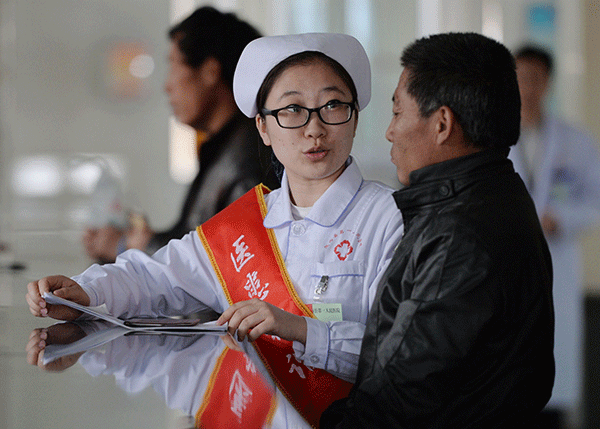 |
|
A nurse explains how to claim reimbursement from the national medical insurance program in Longxi County No 1 People's Hospital in Gansu province.[Photo/Xinhua] |
Retirees will possibly have to continue paying medical insurance. This is the message Minister of Finance Lou Jiwei gave in an article published at the end of 2015. It is both big and bad news for retired people who have long taken it for granted that they can enjoy their remaining years on regular pensions without paying any extra charges.
It will be very difficult for retirees to accept this policy, and they have reasons to believe that their living standards are being compromised by deducting a part, even if it's small, of their pensions for medical insurance.
Currently, after retirement civil servants as well as employees of State-owned enterprises and other institutions stop paying medical insurance. Given that they have worked for several decades and were underpaid during their younger days, they have been exempted from paying any extra fees or taxes and can enjoy their remaining years with the regular pensions they get.
The problem is that by the end of 2014 the number of senior citizens had reached 212 million, or more than 15 percent of the total population. And the reality is that the medical expenses of aged people are much higher than that of their younger counterparts who are still working and paying medical insurance. The rapid increase in the number of retired people will make it impossible for medical insurance accounts in various regions to meet their healthcare needs. Statistics show that medical insurance accounts in 225 regions are in the red by the end of 2013, accounting for 32 percent of the total.
By 2020, the number of people aged 60 or above will be 250 million, exerting even greater pressure on medical insurance funds. So the majority of citizens, especially retirees, may have to pay some medical insurance in the near future to enjoy better and cheap healthcare services. This could be one of the solutions to the medical insurance fund-shortage problem.
However, careful calculations must be made for people in different cities and even counties. In cities where the medical insurance accounts register a surplus, there is certainly no need for the retirees to continue paying medical insurance. In other words, the standards for such payments should be different for different circumstances in different regions.
And importantly, such payments should not be too high to harm the lifestyles of retired people.

Charlotte and Emilie Meaud, twin sisters, were killed at the terrace of the Carillon, during the attacks on Paris, on the 13th of November.